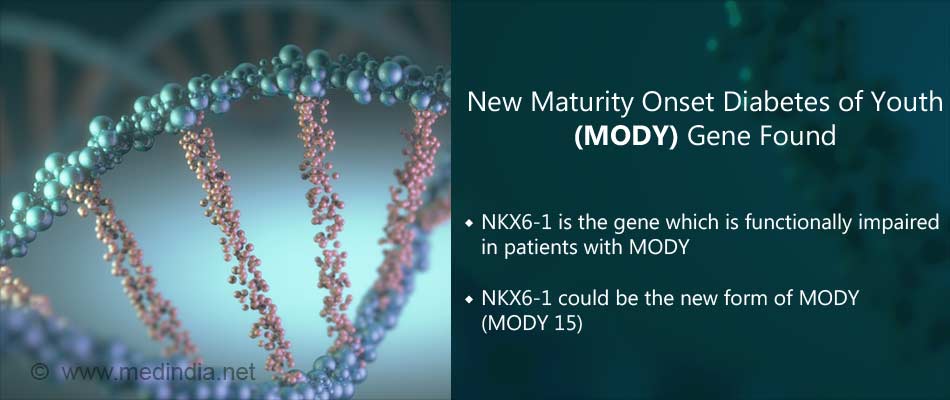Diabetologist explains Maturity-Onset Diabetes of Youth (MODY) a type of monogenic diabetes caused by defect in a single gene. Only genetic tests can determine the type of MODY to treat diabetic patients.
Highlights:- A rare gene which is linked to
Maturity Onset Diabetes of Youth (MODY) has been identified by
Indian scientists
- MODY occurs due to the defect in a single gene.
There are 14 different types of MODY. The gene discovery could be the new
form of MODY
- Renowned diabetologist Dr V Mohan, spoke to
Medindia in an exclusive interview about MODY and the gene discovery
Conventionally, diabetes has been categorized into two sub-types - type 1 and type 2
diabetes. Now, scientists have identified at least 20
types of diabetes. The diagnosis of each type is based
on certain tests that will help the diabetologist to diagnose the condition
more accurately and accordingly take treatment decisions. A patient diagnosed with diabetes may not respond better to the
same treatment given to another diabetic patient. For example, patients with
type 1 diabetes may need insulin injections for life, while patients with type
2 diabetes respond better to medications than insulin.
Maturity Onset
Diabetes of Youth (MODY) is a newly identified form of
diabetes that occurs due to the defect in a single
gene. So far, scientists have identified six variants
of MODY, including three PDX1 variants P33T, E224K, P242L, HNF4A V169I, BLK
A71T and NEUROD1 H241Q, previously reported to be linked to MODY.
TOP INSIGHT
The principles of ‘Precision Diabetes’ can be used to determine the type of diabetes like the type of monogenic diabetes called Maturity-Onset Diabetes of Youth (MODY) and then decide the type of treatment that the patient is likely to respond to.
Some forms of
diabetes are treatable. Very often children with a lean body mass with elevated
blood sugars are often misdiagnosed to have type 1 diabetes and treated with
insulin. Some types of MODY like MODY 1, MODY 3, MODY 11 and MODY 12 respond
better to sulphonylurea which is an inexpensive drug that works well on these
patients.
Dr. V. Mohan, Chairman & Chief of Diabetology, Dr. Mohan’s
Diabetes Specialities Centre, and ICMR Centre for Advanced Research on
Diabetes, spoke to Medindia about MODY and the new gene
discovery.  Q: What is
the prevalence of patients diagnosed with MODY in India?
Ans:
Q: What is
the prevalence of patients diagnosed with MODY in India?
Ans: Approximately about
1% - 2%
of all patients with diabetes probably have MODY. However, as genetic
testing needs to be done to diagnose MODY and large-scale
epidemiological studies are extremely difficult to do,
the exact prevalence of MODY remains unknown. However, if we narrow down the
clinical phenotype to those who have diabetes in three or more generations in
the family and follow the other clinical criteria for MODY, then out of every
100 patients in whom we do genetic testing for MODY, about 25 – 30% are found
to have MODY. There are about 14 known forms of MODY,
of which MODY 1 and 3 are the most common types. In India, MODY 3 is the most
common, but we know that the prevalence of MODY 3 is higher among the Western
population.
Q: What are
the genetic tests to diagnose MODY?
Ans: There is a panel of genetic tests to diagnose the different forms
of MODY. If clinically suspected, the test should be done as soon as the
diagnosis of diabetes is made, so that the proper treatment can be administered
from the very beginning. For testing MODY, we use a genetic chip called
the
Next Generation Sequencing (NGS),
which helps us to screen the entire genetic mutation. In our
recent breakthrough research, we discovered
a new gene mutation called NKX6-1, which is MODY 15 that occurs due to
the mutation in chromosome 17. In patients with MODY,
NKX6-1 were functionally impaired. NGS can determine the type of MODY,
which helps us determine the type of treatment the patient is likely to respond
to.
Q: If a person has a strong
family history of diabetes, at what age should he/she take the genetic test for
MODY?
Ans: We do not recommend a
genetic test for MODY before being diagnosed with diabetes. MODY is more common
among individuals before the age of 25 years. Thus, an individual with a strong
family history of diabetes may have to take a blood sugar test at the age of 15.
If the test is positive, he/she can go for a genetic test to diagnose the type
of MODY. A family might go through a lot of mental trauma, if they were
informed that their child might develop MODY. Thus, it is highly recommended
that the
genetic test to be taken only if the individual is
diabetic.
Q: Can technologies
like CRISPR be of any help in treating these genetic conditions?
Ans: CRISPR technology can be used to edit the gene mutations in the human
genome thus helping in correcting and treating these disease conditions. But,
before that, one needs to find the mutation and prove that the particular
mutation is causing the disease. Then it can be edited using CRISPR. These
techniques are not yet applied in the case of MODY and it may not be
useful.
Source-Medindia


 MEDINDIA
MEDINDIA




 Email
Email










